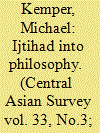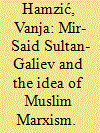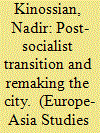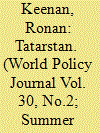| Srl | Item |
| 1 |
ID:
134375


|
|
|
|
|
| Summary/Abstract |
Starting in 1960, authors of various Daghestani nationalities initiated a re-evaluation of the role of Islam in the history of Daghestan. An important historical personality to draw upon was Muhammad al-Quduqi, a Daghestani Islamic legal scholar of the late seventeenth and early eighteenth centuries. Quduqi was known for his sympathies towards ijtihad (Islamic legal reasoning by analogy) and for his call to replace customary law by Islamic law. This article studies how Quduqi was brought back into Soviet discourse in 1960, and how his advocacy for ijtihad was subsequently interpreted in Marxist terms as a quest for philosophy, rationalism and progress, with secularizing terms drawn from the discourse of Daghestani Jadids of the 1920s and 1930s. A comparison is then made with Soviet Tatarstan, where Marxist historians constructed a similar autochthonous trajectory of Tatar-Islamic progress and enlightenment. In both cases, Islamic concepts were taken out of context and used for the construction of a secularized national Muslim cultural heritage (miras) that would prepare the ground for socialism – with the difference that in Daghestan, this Muslim Mirasism was multi-ethnic in character.
|
|
|
|
|
|
|
|
|
|
|
|
|
|
|
|
| 2 |
ID:
148283


|
|
|
|
|
| Summary/Abstract |
This paper revisits the idea of Muslim Marxism, as espoused through the life and work of the Tatar Muslim and Bolshevik intellectual and revolutionary Mir-Said Sultan-Galiev (1892–1940). I argue that Sultan-Galiev’s oeuvre – a unique synthesis of Marxist, Muslim modernist, anti-colonial and Third World praxis – represents a path-breaking take on Muslim selfhood and practices of belonging.
|
|
|
|
|
|
|
|
|
|
|
|
|
|
|
|
| 3 |
ID:
114175


|
|
|
|
|
| Publication |
2012.
|
| Summary/Abstract |
Heritage is becoming a significant element of the urban landscape of the post-socialist city. The emerging contested landscapes reflect new political identities and competition between different political actors for influence. In the 1990s, state-sovereignty movements in Russia's ethnic republics gave rise to urban projects aimed at expressing the ideas of nation building, ethnic and religious awareness and new interpretations of the past. The article explores the role of the state in creating heritage discourses and practices by using as a case study the 'resurrection' of the Kul-Sharif Mosque in the Kazan Kremlin in the period 1995-2005.
|
|
|
|
|
|
|
|
|
|
|
|
|
|
|
|
| 4 |
ID:
011094


|
|
|
|
|
| Publication |
March 1996.
|
| Description |
69-80
|
|
|
|
|
|
|
|
|
|
|
|
|
|
|
|
| 5 |
ID:
125939


|
|
|
|
|
| Publication |
2013.
|
| Summary/Abstract |
KAZAN, Tatarstan-Shelves of vodka line a shop wall in Kazan, the capital of the Tatarstan republic. Just opposite, Islamic prayer beads sit in heaps on a rack. In this Russian-ruled region with a Muslim majority, bars and mosques exist side by side. A nearby store advertises clothing for Muslim women, and inside, Zulfia, one of the two female owners, helps customers with traditional headscarves and brightly colored skirts. Since she opened the store nine years ago, Zulfia says demand is increasing as women embrace Muslim traditions with a modern twist. Outside, the Kazan Kremlin, a citadel home to Tatarstan's president, stands elevated on the banks of the Kazanka River where its Islamic minarets and Orthodox domes overlook the city.
|
|
|
|
|
|
|
|
|
|
|
|
|
|
|
|
| 6 |
ID:
011093


|
|
|
|
|
| Publication |
March 1996.
|
| Description |
81-86
|
|
|
|
|
|
|
|
|
|
|
|
|
|
|
|
| 7 |
ID:
159216


|
|
|
|
|
| Summary/Abstract |
Discussions generated in Russian and Western academic, policy-making and media circles by recent terrorist attacks in the Middle Volga and Urals (İdel-Ural) derive primarily from hegemonic state discourses and as such miss the wealth of discussion generated in local-language sources about the causes and implications of these attacks. The goal of this study is to provide an examination of the various perspectives concerning terrorism in the region, focusing on the level of Tatar (and secondarily Russian) society. Employing insights from a recent body of literature on ‘everyday’ and ‘vernacular’ (in)securities as well as on conspiracy theories, I examine Tatar-language Internet forums posted on the Radio Free Europe website related to the terror events of July 2012. I detect no incitement to violence among the Tatar-speaking participants. However, my results suggest that Tatar publics use diverse interpretive repertoires to make sense of a securitizing reality. The study suggests that Tatar-speaking publics depart in important ways from the dominant narrative of the ‘police’ order as well as from the Weltanschauung of their Russian-speaking compatriots.
|
|
|
|
|
|
|
|
|
|
|
|
|
|
|
|